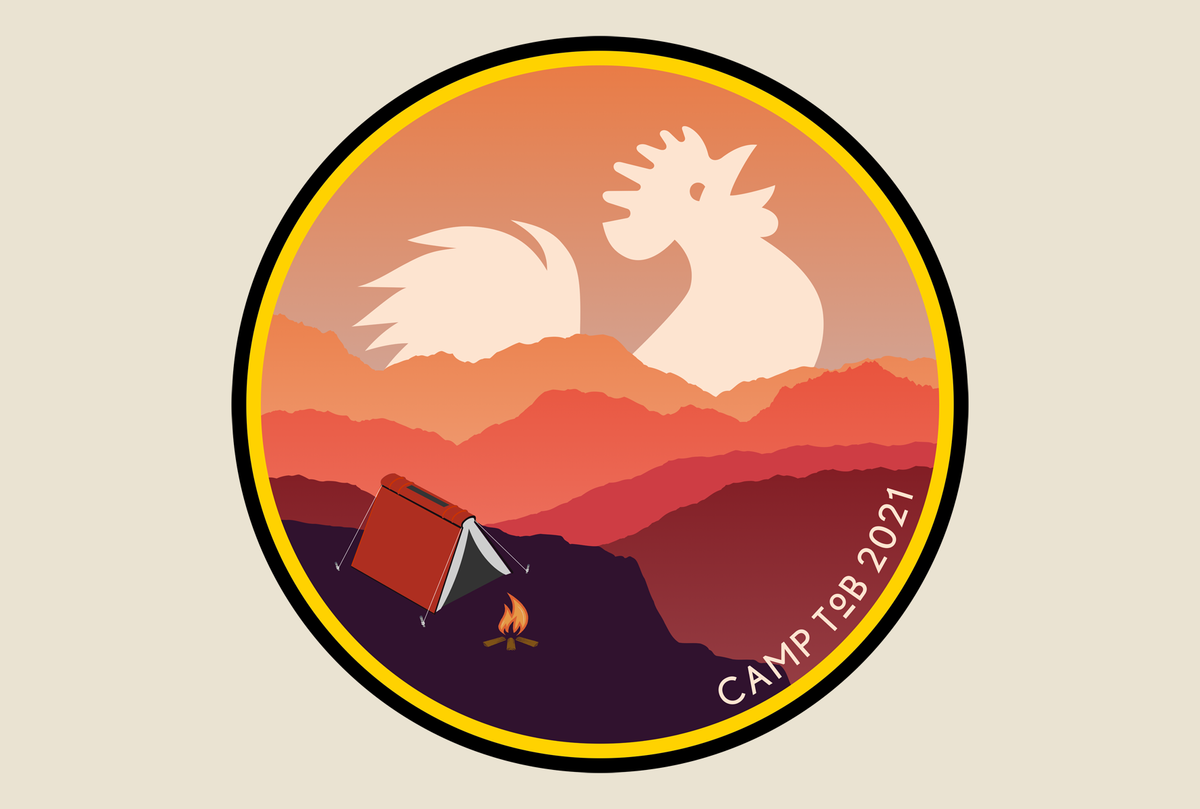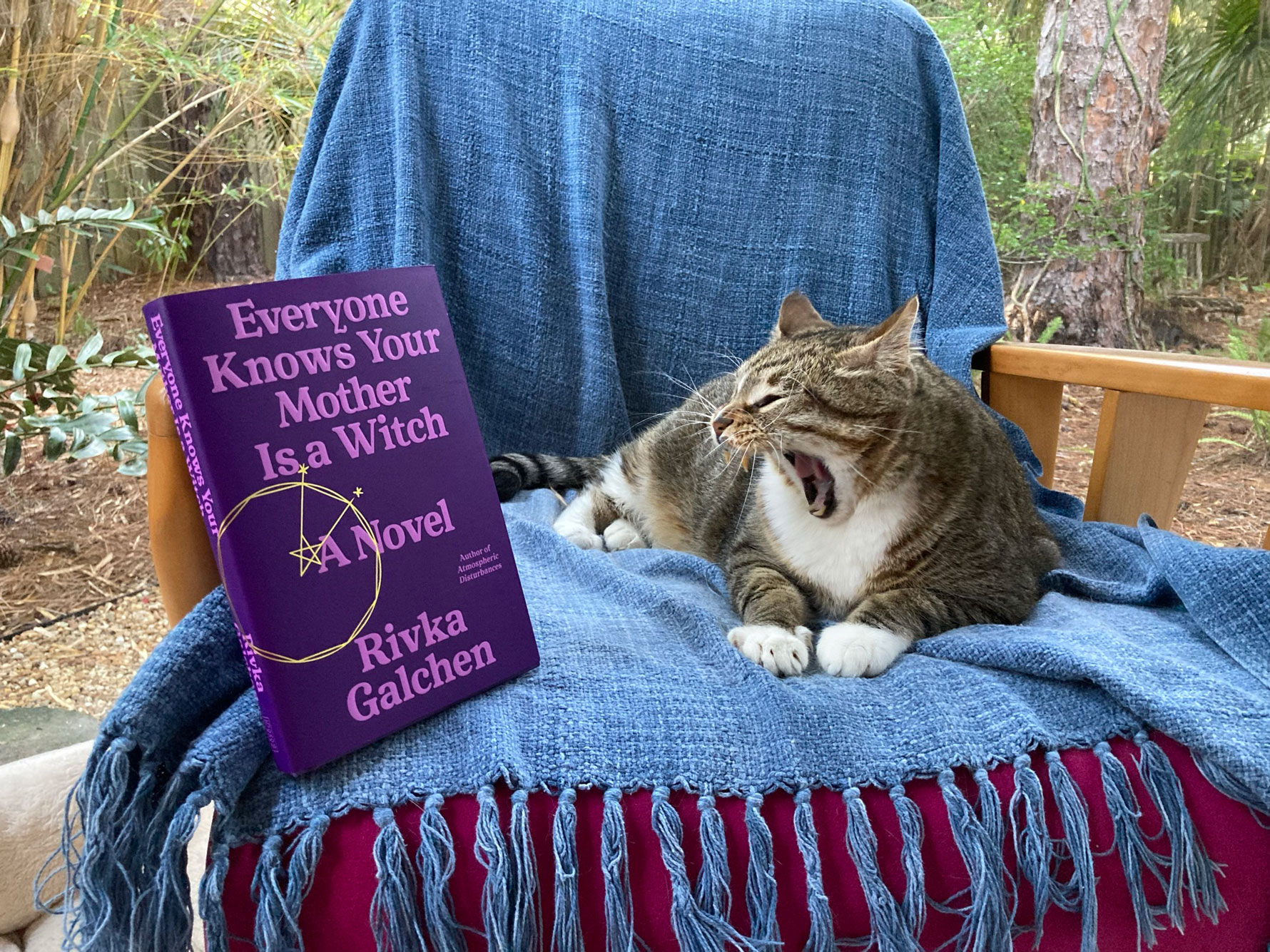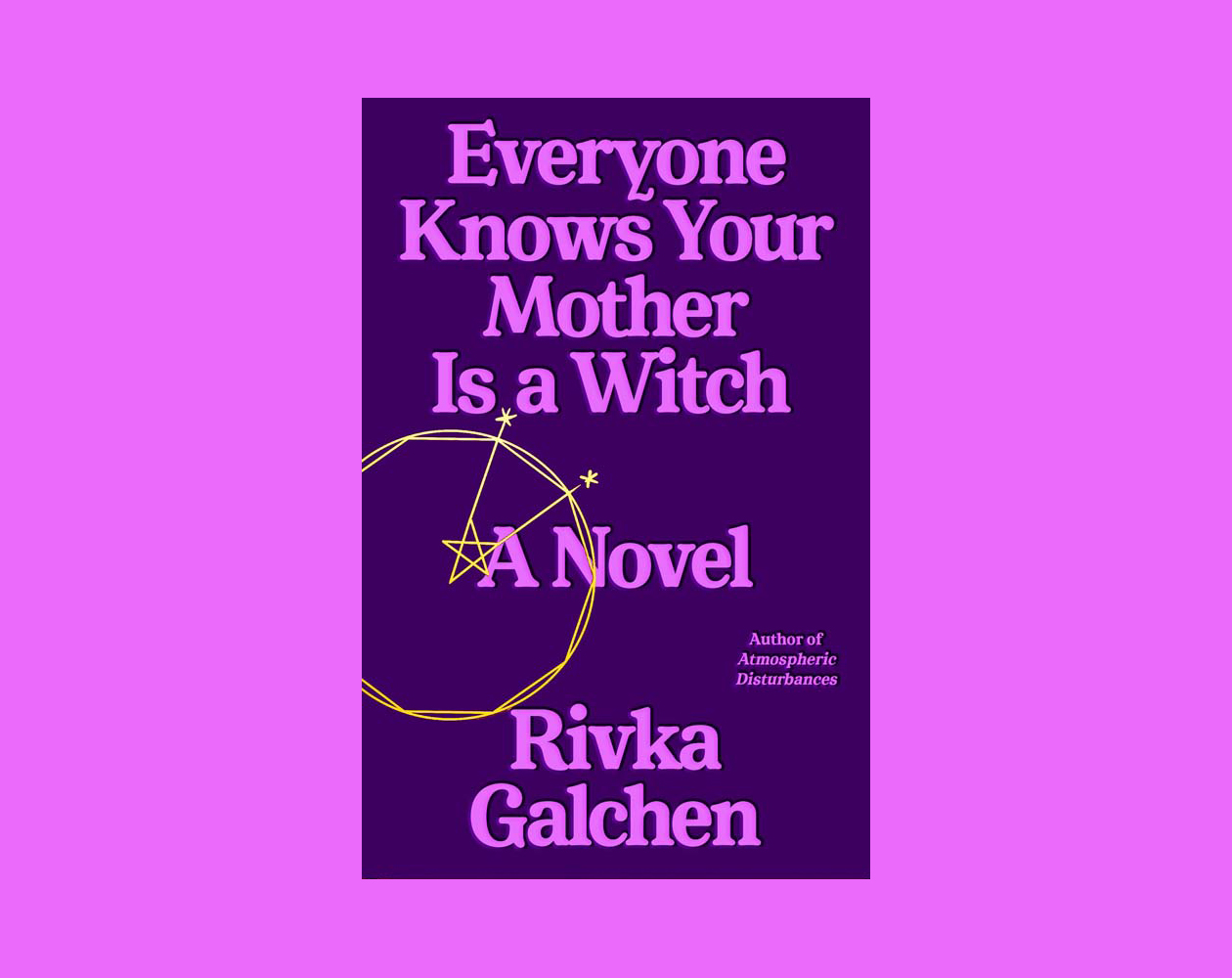Week 12: Everyone Knows Your Mother Is a Witch
This week, we discuss the conclusion of Rivka Galchen's Everyone Knows Your Mother Is a Witch—and it's time for you to vote on which of our August novels advances to our end-of-summer finale!

Update: Your votes are in, and the winner of Camp ToB 2021 is Klara and the Sun by Kazuo Ishiguro! That means Klara and the Sun is now headed to the 2022 Tournament of Books—in case you missed it the first time around, you can still catch up on our discussion of the book's first half and second half.
Thank you to all our Activity Leaders and everyone who followed along this summer—we hope you had as much fun as we did. And thank you also to our Sustaining Members and everyone who's donated in support of the Tournament of Books. Your generosity truly makes a difference, and helps ensure the future of the Tournament and events like Camp ToB. If you haven't already, please find out why we need your help, and consider throwing some support our way.
Andrew Womack: Welcome to the final week of Camp ToB 2021! We've all had fun over the past three months reading and discussing along with you, and we hope you've enjoyed our summer reads as well.
We're now down to the second half of our final novel of the season: Rivka Galchen's Everyone Knows Your Mother Is a Witch. At the end of today's discussion you'll find a poll for you to vote on which of this month's novels—Peaces or Everyone Knows Your Mother Is a Witch—will head to our end-of-summer finale, where it will face our other summer finalists, No One Is Talking About This and Klara and the Sun, in a final poll to decide which novel will earn a place in the 2022 Tournament of Books.
(FYI, the five books we read this summer that don't win may still qualify for the 2022 ToB's long or short lists.)
Now that we have that out of the way, let's get to our final discussion! Joining us this week as Activity Leader is Andrea Ginsky. Andrea, please introduce yourself to everyone!
Andrea Ginsky: Hi Andrew, I'm so thrilled to be taking part in Camp ToB. I've followed the Tournament of Books for years and never imagined I'd be an Activity Leader.
I've been in the book business for a long time. I am a retired librarian in Sarasota, Fla., who now has the best retirement job there can be…working at the local independent bookstore, Bookstore1Sarasota.
Andrew: Oh, lovely. We adore both of your occupations. Tell us more!
Andrea: In the libraries, I was a reference librarian in the Sarasota County Library System and then a supervisor and administrator. One library project I always loved and was proud of was "One Book Sarasota," where the whole community is encouraged to read the same book. We were kind of rebellious in the libraries and had the county's first Facebook page, which gave us new ways to promote reading and books.
At the bookstore I am a bookseller as well as the web editor and PR and social media person. It's a fun job!
Andrew: And how has bookselling been for you during the pandemic?
Andrea: Like most nonessential retail businesses, the store was closed to the public for six months. During that time we launched a new website and online store. So that helped. And we had curbside pickup. Since we are in Florida, everything opened up, and we reopened in September last year. Since then, we have been doing really well. We are a touristy town, and lots of people came to Florida because they wanted to be somewhere less restrictive.
Andrew: And can you tell us about your reading go-tos? What genres do you prefer?
Andrea: Since I work at a bookstore and do a lot of their promotional work, I have to say I mostly lean toward new contemporary fiction. I have a bunch of Advanced Reader Copies of books downloaded. While I don't always read everything I have before it's published, I try to keep up. I also dip into the occasional mystery and memoir.

Andrew: And how about historical fiction, our genre for today's discussion?
Andrea: Historical fiction is not usually a genre I read much of, but that might change. After reading Everyone Knows Your Mother Is a Witch, I read Maggie O'Farrell's Hamnet, and loved it. And I have to add that my husband is a mathematician, and we talked about Kepler and Everyone Knows Your Mother Is a Witch.
Andrew: The historical significance of Katharina's son, Johannes Kepler, was a topic that came up in the comments last week! Can you tell us some of what you and your husband discussed?
Andrea: Well, one thing he encouraged me to do is to learn a little about Kepler. So, I now have some understanding of Kepler's laws of planetary motion, although some of it is still beyond me.
We also talked about the role of superstition during that time period, and how astrology and fortune telling were changing toward astronomy and science.
My husband reads a lot of fiction, so we also chatted about the book in general. He thought it was a little dry, where I found it more moving. He found Katharina to be a busybody, where I was more emotionally involved with her. He was also intrigued by the symbolism of the graphic on the cover. He thought it fitted the theme of orbits and the move from astrology to astronomy. Or, is it a pentacle, a symbol of protection?
Andrew: I'm going to say possibly both? So let's get into the second half of the book. Katharina is eventually acquitted, but it was hardly an easy road, and then the plague hits and many of our characters die as a result. How did you feel about how everything turned out?
Andrea: Since almost everyone dies at the end I have to say I felt sad. The struggles that Katarina goes through, along with the hardship all around her, made me feel very grateful at how far the world has come.
I was especially despondent when Katheraina's granddaughter Maruschl died.
Andrew: Oh, that was crushing.
Everyone Knows Your Mother Is a Witch by Rivka Galchen

In the small town of Leonberg in 1618, Katharina, an illiterate widow, is known by her neighbors for her herbal remedies and the success of her children, including her eldest, Johannes, the renowned author of the laws of planetary motion. It's enough to make anyone jealous, and Katharina has done herself no favors by being out and about and in everyone's business. So when the deranged and insipid Ursula Reinbold accuses Katharina of offering her a bitter, witchy drink that has made her ill, Katharina is in trouble. Her son must turn his attention from the music of the spheres to the job of defending his mother. Facing the threat of financial ruin, torture, and even execution, Katharina tells her side of the story to her friend and neighbor Simon, a reclusive widower imperiled by his own secrets.
Book description excerpted from publisher's summary and edited for length.
Andrea: It was. From interviews I've read with Galchen, I think the idea of losing a child is very devastating to her as well. In an interview with Powell's Bookstore she talks about how scary this was to her. She told the interviewer that "I was almost scared to write about a child death, because in some superstitious way, I didn't want to make a prophecy."
Andrew: And sadly, such a fact of life. Certainly part of life in the day and age of this novel's setting. The character's passing serves a purpose though, would you say?
Andrea: While that was not at the end of the story, it seemed a turning point for Katharina. She seemed untethered after that happened.
Before I read the book, I really hadn't given much thought to the 17th century. It really was such a turning point for science and literature. Katharina's story seemed to encapsulate the roles of myth and the supernatural, coupled with a distrust for science, even while the world was intellectually progressing. The fact that this was based on a true story made it even more moving, as well as odd.
Andrew: As a devout non-reader of review or jacket copy prior to reading a book, that this novel is based on a true story was something I didn't know going in. I made the very general connection to Johannes Kepler as I was reading, but I don't know anything about his life, and certainly I knew nothing about his mother or this trial. But I agree. Certainly it's fiction, but how real lives were upturned by these accusations is made quite real in this story.
All in all, I really enjoyed this book. What about you? Thinking of the book as a whole, how satisfied were you, as a reader?
Andrea: I agree, it was a great read. I did something I rarely do, which is to read it twice, and I am so glad I did. After the first reading it seemed kind of quirky and even a little funny. After the second reading the characters were so much deeper and the darkness of the period in history so much more apparent. I still laughed at the metaphors and adages, but was much more moved by how gossip, suspicion, jealousy, and misunderstanding can change someone's life.
Andrew: And what about the title? We had some discussion about this in the comments last week as well, and it's interesting when you stress certain parts of the phrasing—like, is it EVERYONE SAYS your mother is a witch, and therefore they must be right?
Andrea: It is an odd thing, although I knew that Katherina was absolutely not a witch, the testimonies were so convincing I could understand how close she could come to being convicted. Everyone does seem to really know, in the sense of believing it is so, that she is a witch. If the title was Everyone Says Your Mother Is a Witch, rather than Everyone Knows Your Mother Is a Witch, I think there would be more doubt in the community. While it is still your word against mine, there is more room for hearsay. The title made me feel everyone was sure that Katharina was a witch, especially by the end of the story.
Andrew: So let's talk about the plague. In the second half it starts killing off many of the townsfolk. How much do you think the accusations against Katharina and other "witches" were actually incidents that could be attributed to the plague, or even plague paranoia, as our story takes place amid multiple waves of the plague?
Andrea: I have tried to imagine what it would have been like to live in the 1600s. While we have a pandemic now, we have modern medicine, science, and technology to guide us, and hopefully to keep us safe. Back then, there was so much death and deprivation, it is hard to fathom how people managed with that much anxiety day to day. To me, much of the story has to do with fear of the plague and superstitions revolving around it. Also, fears of hunger, fears of having to serve in the military, and fears of other accidental deaths and injuries.
Toward the end of the book Pastor Jungel's sermon encapsulates these fears: "That our world is in decline is not a hidden truth … We have never had so few fish. Both stones and iron have grown less solid. Trees are shorter. The sky is less blue … The blood of our young men runs in the rivers."
Andrew: Which sounds like something we might hear today. And to that point, something I wondered about as I finished the book was: Why write this book, in this way, at this moment? Then, as now, we have a pandemic. Then, as now, we have whispering suspicions and falsehoods spreading like wildfire through our (virtual) communities. What do you think Everyone Knows Your Mother Is a Witch says about our current moment?
Andrea: It is really amazing to me how timely it is. I've wondered when Galchen actually was writing the story. We all know that Trump liked to use the term "witch hunt" to prove his own innocence. I find the amount of suspicion and distrust in our world today very distressing and disheartening. It almost makes a real witch hunt seem plausible. Galchen's ability to have us thinking about the current moment in terms of the past is uncanny.
It's not just our virtual communities that are falling prey to falsehoods and false accusations. Local school board meetings and political rallies have broken down to the masked and the unmasked, the science believers and the science deniers. Who would have thought we would be in this place? We are in a world where the unbelievable happens everyday. Maybe witches could help us get back to a semblance of sanity.
Andrew: I love this. And what about Katharina's role in that regard?
Andrea: In her way, Katharina was a healer. Her belief in herbs and potions was both a balm and part of her undoing. It made me wish she was allowed to be a witch to help those around her. What if everyone knew that being a witch was beneficial, what a different story that would be.
Andrew: And what a different, more magical—and certainly improved—world we'd have. Andrea, thank you so much for joining us today!
Readers, it's now up to you to decide which of this month's novels goes up against our other summer finalists! Register your choice in the poll below by Friday at midnight Eastern Time, and then we'll announce our August finalist and open our end-of-summer poll. Keep your eyes peeled on Twitter, Facebook, and the Rooster newsletter to see that announcement come through!
UPDATE: And we have our August winner: Everyone Knows Your Mother Is a Witch by Rivka Galchen! Now it's time to vote for which of our summer finalists you want to see in the 2022 Tournament of Books. Cast your vote in the form below by Tuesday, Aug. 31 at midnight (ET).
The Camp ToB 2021 Calendar
- June 2: No One Is Talking About This through part one
- June 9: No One Is Talking About This to the end
- June 16: Detransition, Baby through chapter four
- June 23: Detransition, Baby to the end
- June 30: Klara and the Sun through part three
- July 7: VACATION
- July 14: Klara and the Sun to the end
- July 21: Whereabouts through "At the Cash Register"
- July 28: Whereabouts to the end
- Aug. 4: Peaces through chapter eight
- Aug. 11: Peaces to the end
- Aug. 18: Everyone Knows Your Mother Is a Witch through page 137
- Aug. 25: Everyone Knows Your Mother Is a Witch to the end
- Sept. 1: Announce summer champion
You can find all our summer titles at our Camp ToB 2021 Bookshop list.
